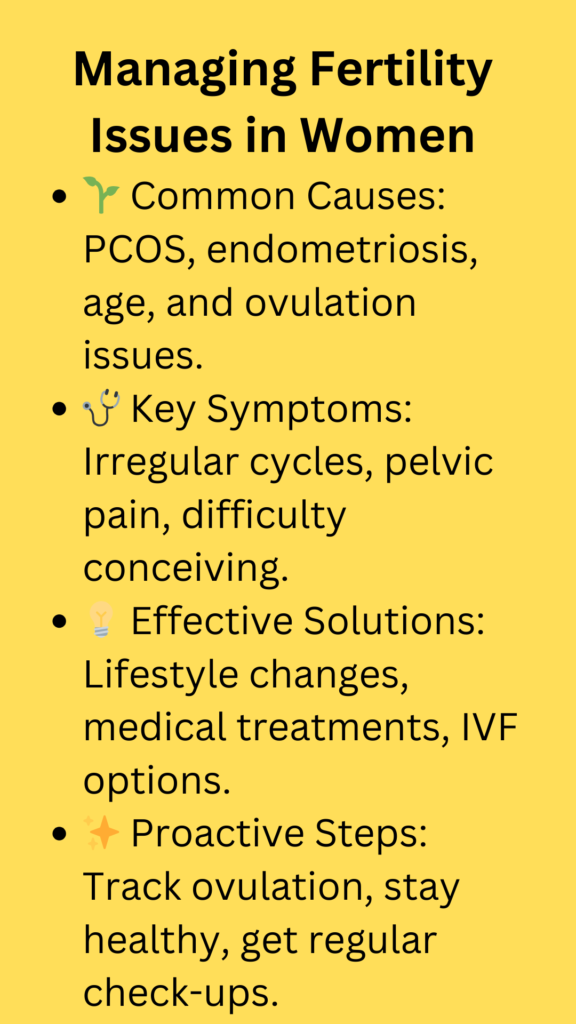Fertility issues can be a significant source of stress and concern for women who wish to conceive. While many factors can affect a woman’s ability to get pregnant, understanding these issues and their potential solutions can empower women on their fertility journey. This blog post will explore common fertility problems women face, their symptoms, causes, and effective solutions to enhance fertility and support reproductive health.

The Importance of Understanding Fertility Issues
Understanding fertility is crucial for women who are planning to start a family or those who are experiencing challenges in conceiving. Fertility issues can stem from various factors, including medical conditions, age, lifestyle choices, and emotional well-being. By addressing these issues proactively, women can increase their chances of conception and promote overall reproductive health.
Why Focus on Women’s Fertility Health?
- Emotional Impact: Fertility issues can lead to feelings of anxiety, depression, and isolation. Understanding and addressing these concerns is vital for emotional well-being.
- Empowerment: Knowledge about fertility can empower women to make informed decisions regarding their reproductive health.
- Proactive Management: Early detection and intervention can significantly enhance the chances of successful conception.
Common Fertility Issues in Women
1. Polycystic Ovary Syndrome (PCOS)
PCOS is a hormonal disorder affecting many women of reproductive age and is one of the leading causes of infertility.
Symptoms: Symptoms include irregular menstrual cycles, excessive hair growth, acne, and weight gain.
Solutions:
- Lifestyle Changes: Adopting a healthy diet and regular exercise can help manage PCOS symptoms and improve fertility.
- Medications: Consult a healthcare provider for options like hormonal birth control or medications to regulate ovulation.
- Fertility Treatments: If conception is challenging, treatments such as ovulation induction or in vitro fertilization (IVF) may be recommended.
2. Endometriosis
Endometriosis occurs when tissue similar to the lining of the uterus grows outside of it, often causing pain and fertility issues.

Symptoms: Common symptoms include severe menstrual cramps, pain during intercourse, and fertility problems.
Solutions:
- Medical Management: Consult a healthcare provider for pain management and treatment options, including hormonal therapy or surgery.
- Fertility Assistance: Discuss fertility treatments such as IVF or fertility preservation options if endometriosis is affecting conception.
- Support Groups: Join support groups for women with endometriosis to share experiences and resources.
3. Age-Related Fertility Decline
As women age, their fertility naturally declines, particularly after the age of 35.
Symptoms: Symptoms are often subtle, but women may notice irregular cycles or difficulty conceiving.
Solutions:
- Fertility Awareness: Track menstrual cycles and ovulation patterns to better understand fertility windows.
- Consult a Fertility Specialist: Seek advice from a fertility specialist if you are over 35 and facing challenges in conceiving.
- Consider Egg Freezing: For women who wish to delay pregnancy, egg freezing can preserve fertility options for the future.
4. Uterine Abnormalities
Uterine abnormalities, such as fibroids or polyps, can affect a woman’s ability to conceive or maintain a pregnancy.
Symptoms: Symptoms may include heavy menstrual bleeding, pelvic pain, or complications during pregnancy.
Solutions:
- Medical Evaluation: Regular gynecological exams can help identify uterine abnormalities early on.
- Surgical Options: Discuss potential surgical interventions with a healthcare provider to remove fibroids or polyps if they interfere with fertility.
- Fertility Treatments: Explore fertility treatments to assist with conception if abnormalities are identified.
5. Ovulation Disorders
Ovulation disorders are conditions that prevent the ovaries from releasing eggs, impacting fertility.
Symptoms: Symptoms may include irregular or absent menstrual periods.
Solutions:
- Ovulation Tracking: Monitor ovulation using home ovulation kits or fertility tracking apps to determine the best times to conceive.
- Hormonal Treatments: Work with a healthcare provider to explore medications that can stimulate ovulation.
- Lifestyle Adjustments: Maintaining a healthy weight and managing stress can improve ovulation regularity.
Tips for Enhancing Fertility
- Healthy Lifestyle: Maintain a balanced diet rich in fruits, vegetables, whole grains, and lean proteins. Avoid excessive alcohol and tobacco use.
- Regular Exercise: Engage in regular physical activity to promote overall health and support reproductive function.
- Manage Stress: Practice stress-reduction techniques such as mindfulness, yoga, or meditation to support emotional well-being.
- Stay Informed: Educate yourself about fertility and reproductive health to make informed decisions and seek appropriate care.
- Consult Healthcare Providers: Regular check-ups with a healthcare provider can help identify potential fertility issues early and provide appropriate interventions.
Conclusion
Fertility issues can be challenging for many women, but understanding common problems and effective solutions can empower them on their journey to conception. By prioritizing reproductive health and seeking professional guidance, women can enhance their fertility prospects and improve their overall well-being. If you are facing fertility challenges, don’t hesitate to consult a healthcare provider for support and resources tailored to your needs.
Empowering women to understand and manage their fertility issues is essential for fostering hope and resilience. Together, we can advocate for comprehensive reproductive health education and support one another on the journey to motherhood.
